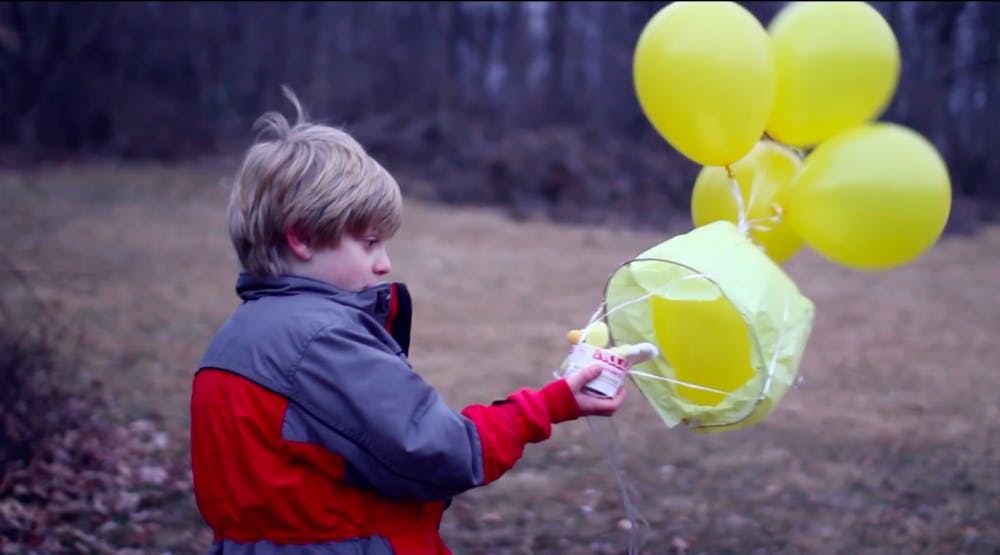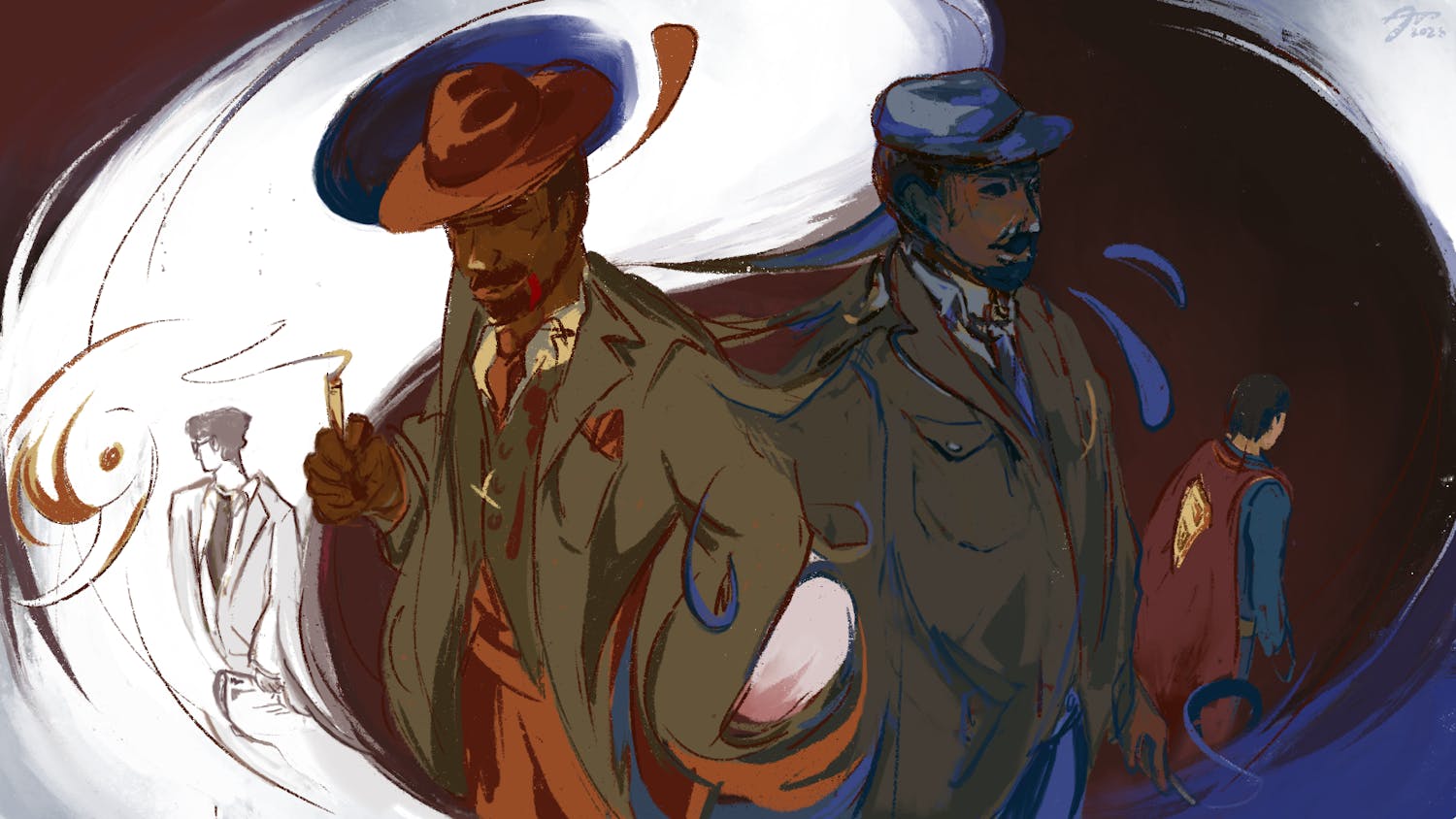"It's a secret diner," Amanda Prager (C’18) says as she marches down 40th Street. “It’s like a real fucking diner, ya know?”
Amanda is always hunting for inspiration. And right now, that inspiration is Hamilton Diner, on the corner of 40th and Market. As a filmmaker, Amanda has the ability to elevate the pedestrian into art—to see everything as part of a story. To most people, the run–down diner's peeling green–grey exterior and faded yellow writing is anything but exciting. For Amanda, however, the Hamilton Diner has charm, allure and potential.
Once inside, the Hamilton Diner does reveal itself to be a so–called “real” diner. With a shiny plastic counter, rubbery blue stools and “Build Me Up Buttercup” by The Foundations playing through the tinny, metallic speakers, the place feels straight out of the 1950’s. Amanda sits down and pulls off her rain–soaked hoodie. Over two eggs sunny side up, grits and a side of bacon, Amanda tells me a little bit about herself.
Apart from starting Opia (a film club that brings together cinematographers, actors and producers from across campus; read Street's piece about it here), she's involved with many other campus organizations: The Undergraduate Media and Entertainment Club, Penn Lens, Jazz and Grooves and Chi Omega, to name a few. In fact, Street has already covered several of her more recent projects, including a music video for Magdalena Bay and a documentary about online dating within the Jewish community. She spent last summer in Cannes working as a distribution intern for Other Angle Pictures, a French film company, and attended the Cannes Film Festival. Alongside the CEO of the company, Amanda experienced the business side of the industry first–hand.“They were dropping hundred thousand dollar to million dollar deals and I was right next to them,” she explains as she animatedly strips the fat from her bacon, crunching on the crispy parts.

Majoring in Cinema Studies and English, Amanda is also a Consumer Psychology minor––which has come in handy throughout her artistic career. Through her experience at Cannes, her minor and some of the Wharton Media programs she’s participated in, Amanda has developed a good sense for the economic side of film. But Amanda’s true passion lies behind the camera. Her accomplishment speak for themselves: Amanda's 2016 short film, No Whammies, won her second place in the 48 hour Ivy Film Festival; she was a 2015 Horizon Award Finalist. She was also on a student team of videographers and interviewers working on the 2016 documentary, The Hunting Ground, which focused on campus sexual assault cases. The film was short–listed for an Academy Award for Best Feature Documentary, nominated for Best Motion Picture and won the Producers Guild of America 2016 Stanley Kramer Award (visit the website here).
It's tough to get Amanda to talk about herself. But when she stars talking about one of her earliest films, Look Up, her cheeks flush and her words flow. The project was "the most significant thing that made me realize that film could be a career of mine," she explains while popping the yellow yolk of her eggs. “I made it when I was a sophomore in high school because my town was having a film festival, and I was like maybe I’ll try to win this, or at least come in fifth.”
When she and her friend, co–producer and co–director, Jake Oleson, submitted their film to the Millburn Film Festival, Amanda was shocked. “We won with flying colors,” she says. The film went on to garner national attention.
"The people at Millburn were like, 'You need to send this other places.' I didn’t know what the heck I was doing," Amanda says. I sent it to about 50 festivals, and it got in at about 50 festivals… It won the Hartland Film Festival, best narrative short of WHYY Youth Media… All of a sudden, it grew to be this huge thing, this sort of sensation.”
Set in American Suburbia, Look Up is a mix of tender heartbreak, youthful hope and cold, elusive clarity. It showcases the struggles of a young boy and his feathery, stuffed companion as they try to fly. Filmed on a Canon 60d, Look Up combines cool high–contrast shots with bright saturated ones, adding pops of color to the grey suburban landscape. The result is a dream–like juxtaposition of the bittersweet and the innocent in a way reminiscent of Pixar’s Up. Amanda and Jake follow the young boy, cutting between shots of open sky, his cozy den and his trial and error process of flight. Ultimately, the young hero parts ways with his stuffed duck, realizing that it can fly, while he can’t.
“When I was a kid I always wanted to fly, and I thought I could fly," Amanda says. "I thought part of being an adult was that you learned how to fly.... [But] my dad [told me], 'Amanda you’re getting older, you need to learn what’s true and what’s not because you live in your own little fantasy world'… [he told me] human beings can’t fly…I thought he was lying to me until I realized that was true.” Amanda tucks a blonde strand of hair behind her ear. “'Look Up' reflects a previous time in my life where I was losing my innocence and learning about what being an adult was… The film itself is very much about the transition to another stage of learning.”
On many levels, Look Up was a learning experience for Amanda. Prior to the short, she had little to no formal experience in filmmaking, and she realized that a lot more goes into making even a five minute short than one might expect. Laughing, Amanda admits, “film is about the art of stretching a dollar,” something artists of other mediums don’t experience as intensely as filmmakers do. For Look Up, Amanda’s budget was only around 200 dollars, and she made about 20 times that amount back. But her other films, which require a prop list more extensive than just a stuffed duck and a cup of ramen noodles, can cost up to half a grand. Financing these films, therefore, can become an obstacle. In addition to the other groups she’s involved with at Penn, Amanda also produces commercials and writes for Nexo, a small student–run advertising company. Her relationship with advertising is one of necessity: “I don’t want to work in commercials––I find advertising draining,” she clarifies, “[but I] produce commercials for money so that eventually I [can] write the things I [want] to write.”
Amanda acknowledges that writing is emotionally exhausting and something that she does day–in and day–out. She strives to create every day, even if it’s just in a small way.“I wake up every morning, and I write for three pages––just to get it out," she says. Amanda admits that she doesn’t like most of what she produces.
“95 percent of what you write is going to be awful––every single time––and you have to accept that. And that’s why you have to write more, because that five percent will keep getting a little bigger… you’re going to get better.” Amanda’s creative process also requires a step of distillation, a waiting period for her to determine whether or not she likes what she’s written: “Usually if I just don’t hate its guts immediately, I [think] maybe it’s okay…. the way I know if an idea is good is if it lingers in my mind for more than two weeks.”
And Look Up has been something that, for some reason or another, has lingered with Amanda. Though Amanda recognizes that when she made the film, it was a total shot in the dark, she feels she has grown tremendously. “I feel I am far beyond 'Look Up' in terms of technical and storytelling ability,” she explains, pushing the grits around lazily with her fork. But Look Up remains "... a part of my past and a part of me,” she says boldly.
Amanda describes how, over the past few years, her style “[has been] in flux…. if I had to put a word on my style, it would be dark––dark concepts that have high intellectual potential.” For example, she describes a project she’s currently working on––a science–fiction thriller based off the idea of dating a hive–mind, which is essentially an artificial intelligence concept where many bodies share a single consciousness. She points to the hive–mind as emblematic of the sort of concepts she enjoys––“What if reality was reality,” she begins, explaining her ideal premise for a film, “but just a little more extreme.”
“You can’t ask yourself who you are writing for," Amanda says as she gathers her things and prepares to leave the diner. "Write for one person. Write just for them––assume they are just going to read it, and no one else.” She pulls on her hoodie, making moves for the door. “I know it’s classic to say the artist feels misunderstood, but I really feel like to convey a feeling to another person's consciousness and have them breathe in that moment and empathize is one of the most difficult things. I find it hard to do that in real life, so I attempt to do it through my work––to understand someone else's perspective is one of the most human things and also one of the most difficult things to achieve, but this is what great artists do.”
Amanda has realized her life–long dream of flight. As she walks away from the diner, she is very much grounded––no wings or super–hero capes lift her to the air. Her feet remain where they are: stuck to the dirty Philly sidewalks. Perhaps, though, through her work, Amanda has found that there are other ways of flying.







